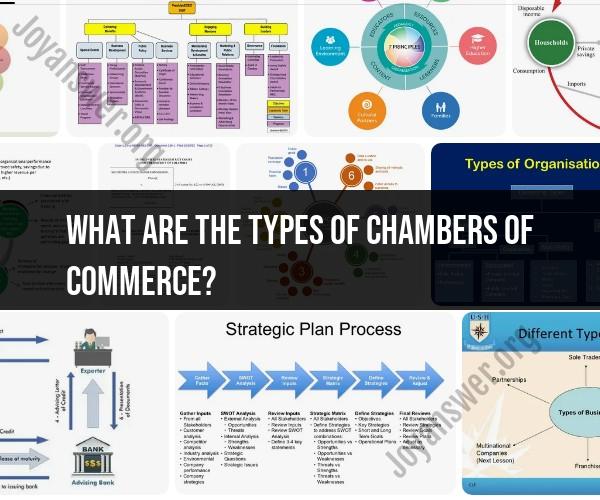What are the types of chambers of Commerce?
Chambers of Commerce are business support organizations that serve the interests of local businesses and promote economic development within a specific region. There are several types of chambers of commerce, each with its own focus and purpose. Here are some common types:
Local Chambers of Commerce:These chambers serve a specific city, town, or region. They are the most common type and provide support to businesses in their local area. They often offer networking events, business advocacy, and resources to help local businesses grow.
Regional Chambers of Commerce:Regional chambers cover a larger geographic area, such as a county or multiple municipalities. They work to coordinate efforts and resources across a broader region, which can be especially important for businesses that operate in multiple areas.
State Chambers of Commerce:State chambers focus on the business climate and policies at the state level. They advocate for statewide business interests, offer resources to businesses, and often work with local and regional chambers to promote economic development.
National Chambers of Commerce:National chambers operate on a country-wide level and focus on broader national business issues. They may advocate for national policies, offer resources to companies doing business across the country, and promote international trade.
Ethnic Chambers of Commerce:These chambers serve businesses owned by a specific ethnic or cultural group. They provide support, networking, and resources tailored to the unique needs of those businesses. For example, there are Hispanic, African American, and Asian chambers of commerce.
Industry-Specific Chambers of Commerce:Some chambers focus on a specific industry, such as technology, healthcare, or manufacturing. They provide industry-specific advocacy, networking opportunities, and resources.
Bilateral Chambers of Commerce:These chambers promote trade and economic ties between two countries. They facilitate business relationships, trade agreements, and investment opportunities between the two nations.
Virtual or Online Chambers of Commerce:Virtual chambers operate primarily online and cater to businesses that operate in the digital realm. They offer webinars, online networking events, and resources for online entrepreneurs.
Nonprofit Chambers of Commerce:Some chambers operate as nonprofit organizations, focusing on supporting social enterprises, nonprofits, and businesses with a strong social or environmental mission.
LGBTQ+ Chambers of Commerce:These chambers are dedicated to supporting LGBTQ+ owned and LGBTQ+ friendly businesses, providing resources and networking opportunities within the LGBTQ+ community.
Young Professional Chambers of Commerce:Geared toward young entrepreneurs and professionals, these chambers offer resources, mentorship, and networking opportunities for emerging business leaders.
Chambers of Commerce can vary in size, scope, and services provided, but their primary goal is to foster economic growth, provide resources to businesses, and represent the interests of the business community in their respective areas.
Exploring Types of Chambers of Commerce: A Comprehensive Guide
Chambers of commerce are non-profit organizations that support and advocate for businesses in their communities. They provide a variety of services to their members, including networking opportunities, educational seminars, and advocacy on behalf of business interests.
There are several different types of chambers of commerce, each with its own focus and membership base. The most common types are:
Local chambers of commerce: These chambers serve businesses in a specific city, town, or county. They typically focus on issues that are relevant to local businesses, such as zoning regulations and economic development.
Regional chambers of commerce: These chambers serve businesses in a larger geographic area, such as a state or metropolitan area. They typically focus on issues that are relevant to businesses across the region, such as transportation and workforce development.
National chambers of commerce: These chambers serve businesses across the country. They typically focus on issues that are relevant to businesses at the national level, such as taxes and trade policy.
In addition to these general types of chambers, there are also specialized chambers that focus on specific industries or sectors of the economy. These chambers can provide valuable resources and support to businesses in their niche.
Local, Regional, and National Chambers of Commerce
Local chambers of commerce are the most common type of chamber. They are typically small organizations with a few staff members and a volunteer board of directors. Local chambers focus on issues that are relevant to businesses in their community, such as zoning regulations, economic development, and tourism promotion.
Regional chambers of commerce serve businesses in a larger geographic area, such as a state or metropolitan area. They typically have a larger staff and budget than local chambers, and they focus on issues that are relevant to businesses across the region, such as transportation, workforce development, and environmental regulations.
National chambers of commerce serve businesses across the country. They typically have a large staff and budget, and they focus on issues that are relevant to businesses at the national level, such as taxes, trade policy, and intellectual property protection.
Specialized Chambers and Industry-Specific Organizations
In addition to general chambers of commerce, there are also specialized chambers that focus on specific industries or sectors of the economy. These chambers can provide valuable resources and support to businesses in their niche.
Some examples of specialized chambers include:
The National Association of Manufacturers (NAM): NAM is a chamber of commerce for manufacturing companies in the United States.
The American Chamber of Commerce in China (AmCham China): AmCham China is a chamber of commerce for American companies doing business in China.
The Hispanic Chamber of Commerce: The Hispanic Chamber of Commerce is a chamber of commerce for Hispanic-owned businesses in the United States.
The Role and Functions of Chambers in Business Communities
Chambers of commerce play an important role in business communities. They provide a variety of services to their members, including:
Networking opportunities: Chambers of commerce organize events and meetings where businesses can connect with each other.
Educational seminars: Chambers of commerce offer educational seminars on a variety of topics, such as marketing, finance, and human resources.
Advocacy on behalf of business interests: Chambers of commerce lobby government officials on behalf of their members.
Benefits of Membership and Involvement in Chambers of Commerce
There are many benefits to membership in a chamber of commerce. These benefits include:
Access to networking opportunities: Chambers of commerce organize events and meetings where businesses can connect with each other.
Access to educational seminars: Chambers of commerce offer educational seminars on a variety of topics, such as marketing, finance, and human resources.
Advocacy on behalf of your business interests: Chambers of commerce lobby government officials on behalf of their members.
Increased visibility for your business: Chambers of commerce can help promote your business to the community.
Discounts on business services: Chambers of commerce often negotiate discounts on business services for their members.
If you are a business owner, I encourage you to join your local chamber of commerce. Chambers of commerce can provide valuable resources and support to businesses of all sizes.












